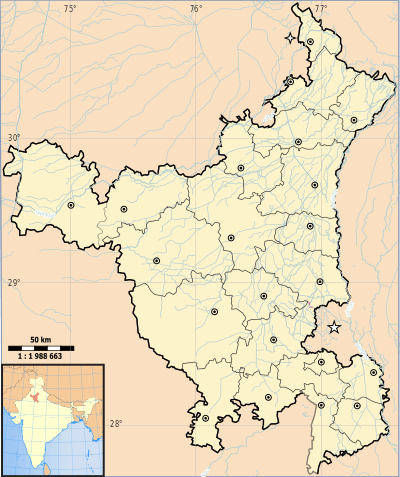Please tell us which country and city you'd like to see the weather in.

Loharu
Loharu (also known as Luharu) is a city and a municipal committee in the Bhiwani district of the Indian state of Haryana. It is the administrative headquarters of one of the four administrative sub-divisions of the district and covers 119 villages. It is also a railway junction station.
It was the seat of the eponymous princely state during the British Raj, established in 1803; and an important reminiscence of that is the Loharu Fort, now a key tourist destination.
Etymology
The town gets its name from the Lohars or blacksmiths of the town who were employed in the minting of coins for the erstwhile Jaipur state.
History
The princely state of Loharu was founded by Ahmad Baksh Khan in 1803 when he received the town of Loharu from the British East India Company as a reward for his services against the Jat rulers of Bharatpur (along with the pargana of 'Firozepur Jirka', now in Gurgaon district, from Lord Lake).
After the Independence of India in 1947, the state acceded unto the Union of India. Many of the ruling family and the city's Muslim inhabitants re-settled in Lahore, Pakistan. However, the Nawab and his direct descendants stayed on, in India (except for Mahbano Begum, the eldest daughter of Nawab Aminuddin Ahmed, who lives in Islamabad).
Loharu (Vidhan Sabha constituency)
Loharu Vidhan Sabha constituency (Hindi: लोहारू विधानसभा निर्वाचन क्षेत्र) is one of the 90 Vidhan Sabha constituencies in Haryana state in northern India.
Overview
Loharu (constituency number 54) is one of the 6 Vidhan Sabha constituencies located in Bhiwani district. This constituency covers the entire Loharu and Siwani tehsils.
Loharu is part of Bhiwani-Mahendragarh Lok Sabha constituency along with eight other Vidhan Sabha segments, namely, Dadri, Badhra, Tosham and Bhiwani in this district and Ateli, Mahendragarh, Narnaul and Nangal Chaudhry in Mahendragarh district.

